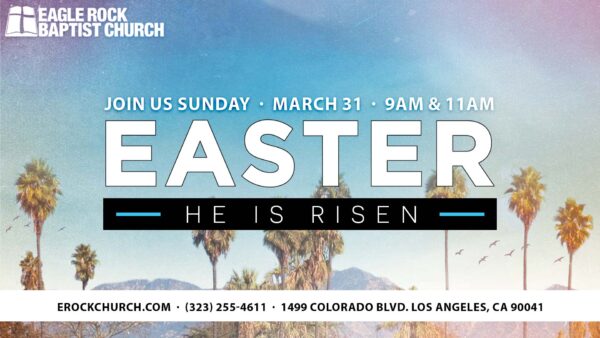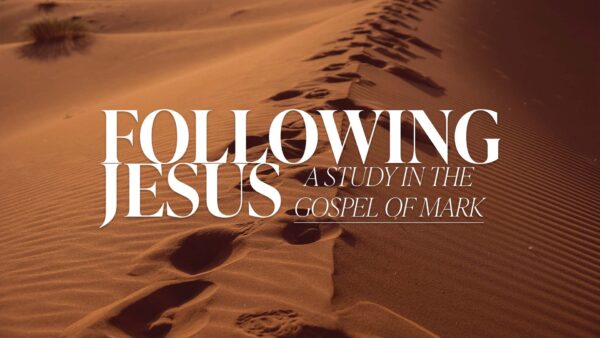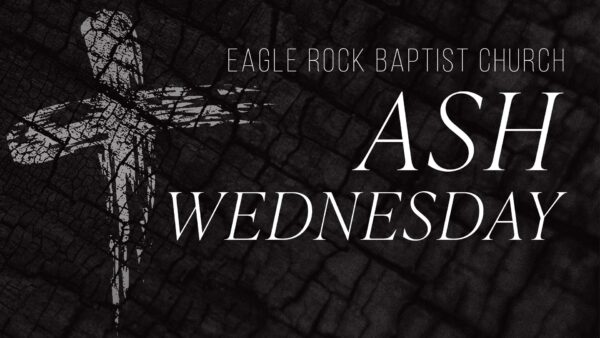Welcome to our SERMON PAGE!
Check out our most recent messages below or browse our archive of Series, Topics, and Speakers.
Loading Content...
Share a Link to this Message
The link has been copied to your clipboard; paste it anywhere you would like to share it.
CloseAndrew Krayer-White - May 23, 2021
Word Six: "Help"
Hi church, it’s so good to be with you. My name is Andrew, I’m one of the Pastor’s here. Today we’re going to continue our series Seven Words to Change Your Life. Our word for today is Help.
There have been a lot of scientific studies done on this, on the differences between the kinds of people who ask for help and those who don’t. And they’ve come up with a pretty simple label for the people who refuse to ask for help – they call them - men.
Seriously, guys don’t deny it. We hate asking for help. Back before my wife and I were married, I was moving into the apartment that she would also move once we were married. When we were moving everything in, we left the refrigerator in a corner of the apartment, kind of, out of the way – but not where we were ultimately intending on putting it. Well, I was in the apartment by myself, unpacking some boxes, and decided the refrigerator was now in the way. So, I decided to move it from the front room to kitchen, by myself without a dolly. I couldn’t push it, couldn’t drag it either, so I decided to pivot it back and forth from corner to corner all the way into place. The problem was the corners of the fridge were sharp and the kitchen floor was this cheap vinyl flooring. As you could imagine. It shredded the floor.
Kristen showed up a little later, and she was mortified. “What happened?” She asked. And I had to be honest. I told her “I think the painters must have dragged their ladders through the kitchen.” To which she responded, “Andrew you need help.” She was right.
All kidding aside, how often do we find ourselves in a position where we need help, and we don’t want to admit it, much less ask for it? Or we need help, but we don’t even know it. We think like I did, “I can handle this.”
Pre-pandemic, if you would have gone to a conference of church leaders – and they were talking about indicators of church health – some of them probably would have said numbers. A growing church is a healthy church. They would argue as we see in Acts that the numbers being added daily was a sign of the Spirit. Others might say giving is a sign of a healthy church. After all Jesus says where your treasure is, there your heart will be also, so percentage giving is a sign of hearts surrendered to Jesus (i.e a healthy church). Others would say baptisms. New believers turning away from their sinful ways and surrendering their lives to Jesus is a sign of a healthy church.
All these are great and they’re all true in their own way. But as I was thinking through this message, it really struck me – that our prayers or lack thereof are an indicator of our health. Think about it. While prayer is many things - often at its most basic it’s asking for help. When you don’t ask for help, often it is on the assumption, “I can handle this. I’ve got this.” There is nothing more antithetical to the Christian life, unhealthier, than the fully self-reliant attitude “I’ve got this.” And the more we live that way the more our lives look like my shredded vinyl floor.
Asking God for help is not a sign of weakness. It’s a sign of spiritual health.
As one of your Pastors, it is of grave concern to us that many of you never share prayer requests. That’s not a sign that everything is going well. It can actually be a sign to us that the most important thing in your life is not.
I hope this hits you where it’s supposed to. My hope and purpose for this message is not to get all of you to fill out a connection card every week, with some perfunctory request. Rather it’s to challenge you. Poke the bear as it were and awaken you to the incredible difference praying “help” can make in your life. To do so, we’re going to look at an admittedly weird passage from the Old Testament, found in the book of 2 Kings, chapter six. Verse one begins this way:
The company of the prophets said to Elisha, “Look, the place where we meet with you is too small for us. Let us go to the Jordan, where each of us can get a pole; and let us build a place there for us to meet.” And he said, “Go.” Then one of them said, “Won’t you please come with your servants?” “I will,” Elisha replied. And he went with them. They went to the Jordan and began to cut down trees. As one of them was cutting down a tree, the iron axhead fell into the water. “Oh no, my lord!” he cried out. “It was borrowed!” The man of God asked, “Where did it fall?” When he showed him the place, Elisha cut a stick and threw it there, and made the iron float. “Lift it out,” he said. Then the man reached out his hand and took it.
As a prophet, Elisha’s primary role would have been to serve as God’s mouthpiece. Yet we have no significant collection of the things he said. Not like Jeremiah, Isaiah or others. What we have is a collection of stories, like the one we just read. What that tells us, is that at least with this prophet, God was more concerned with communicating something about himself through Elisha’s actions than through his words. Elisha was leader of a school of prophets – which was apparently growing, so much so that they had to expand their base of operations. That’s pretty impressive considering it wasn’t long before that the prophet Elijah had complained to God in 1 Kings, “I’m the only one left.”
The story is a pretty practical one. Building a house for the prophets required lumber. So they set off to fell some trees around the Jordan river. Apparently that’s where the good wood was or they wanted a waterfront property. It’s hard to say. Either way, the iron axehead from the one iron axe they possessed went flying off into the Jordan river. Which to us sounds kind of comedic, but of course you couldn’t just go to Home Depot and buy a new axe.
This meant the project would have ground to a stop. Maybe more significant was the fact the axe was borrowed. How familiar does this sound to you? You borrow your neighbors’ belt sander or circular saw for a project around the house and something happens. It catches a nail, or you lose the battery. Oh no, it was borrowed! But this is bigger than a belt sander. Iron was rare and expensive in those days, particularly in Israel of all places.
One scholar suggested that losing a borrowed axe head back then would be like wrecking a borrowed car in our day. And it’s not as if this prophet had disposable income lying around. To repay the debt, the borrower more than likely would have had to sell himself as an indentured servant until the debt was repaid. And so, without hesitation he goes to the man of God.
There are those who rationalize this text and say, what Elisha, the Man of God really did was get a long stick, poke around in the mud until he found it and lifted it out. Or he pushed it through the mud into shallow water where it could be reached and taken out by hand. Those are clever, but that’s clearly not what the story claims. He cut a stick, threw it in and the axe floated up. It’s a great story. Iron floating is pretty cool. But what’s it doing taking up space in scripture? Is this that remarkable? I mean, John the gospel writer tells us
“if every one of the things Jesus did were written down, the whole world would not have room for the books that would be written.” There surely has to be something more than telling the story of a miracle, doesn’t there?
Here’s where it gets interesting. In the story just before this, Elisha heals an individual named Naaman. Naaman, just so happened to be the commander of the army of Aram. Even meeting with Naaman was an action filled with political consequence. Right after the floating axe, we’re told that Israel was at war with Aram, Elisha struck the army of Aram with blindness, and delivered them into the hands of the Israelites. Sandwiched right between these stories filled with profound geopolitical consequences, National stage kind of stuff…is this story of a floating axe head? What in the world?
I’ll tell you what. This is God’s word, and by His word, God is trying to communicate something to us about himself, using these stories, and even their very arrangement. The lesson for us, at least the first one, is God’s not too busy to help and our cares are not too small. We might not be Elisha, but every one of us can identify with the servant with the borrowed axe. We’ve all got things in our lives that we’ve seen sink into the mud and we can’t do anything about it. But we’ve got a God who can and does.
So many of us have been deceived into believing that our prayers are not important enough. We hear the prayer requests of others around and we think well, He’s got bigger fish to fry than listen to me, I can’t bring this to God. Nothing could be further from the truth.
1 Peter 5:7 tells us to “Cast all your anxiety on him because he cares for you.” Like Elisha threw the stick into the water, we are commanded to throw our anxiety, our cares on God. Not to hold onto it, but give it to him. Notice it doesn’t say “cast your big anxieties, or cast your legitimate anxiety or your spiritual anxiety.” There is no qualification. In your Bible, circle the word all. If you feel it, and it weighs you down – give it to him. May we be like the servant in this story, who did not hesitate, before the axe-head hit the muddy bottom of the Jordan, he was pleading for the man of God to intercede with God, to do only what God can do. If only we would have such readiness to cry “Oh Lord, help.”
The very purpose of this passage is to give us permission to bring our borrowed but lost axe heads to God. He hears and delights in answering our genuine needs because he cares for us. If this is you and you find yourself sitting on the bank of the Jordan today, staring down into the deep, wondering what am I going to do? What you need to do is bring it to God. Bring it to the one who cares and has the power to act. Our God made iron float like a feather. Does he raise every axe-head? No. But he hears every cry. His no’s have a reason, and His word invites us to bring our requests to Him in faith.
If the first reason we don’t cry help is because we don’t think our prayers are big enough, I think the second reason is because we don’t think that our prayers are spiritual enough or good enough. Maybe we’ve never been taught to pray so we just don’t know how to do it. Or because we do it so infrequently it always kind of feels like doing something with your non-dominant hand. It feels awkward. And so you don’t because you don’t feel comfortable or don’t think you’re very good at it. If you don’t know this, you need to: God doesn’t answer our prayers because of how long they are, how eloquent they are, or how many Christian words we can jam into them. He answers them because He is good and He is gracious and He is loving.
The second lesson we’re taught here is God invites us to pray what you’ve got.
Whatever is burdening you, whatever is dominating your thoughts or weighs on your heart, keeping you up at night, pray that. Let this prayer be a model for you: “Oh no, my lord! It was borrowed.” I know you can pray that way. Whatever it is: Oh no my Lord, I’m not sure where rent's coming from this month. Oh no my Lord, did you hear the Doctor’s diagnosis? On no my Lord, we just can’t seem to get along. Don’t over think it. God delights in our honesty and simplicity. Let the simplicity of your prayers drive the frequency of your prayers.
How many of us would pray more if we spent less energy trying to think of the right stained glass words to say – and just spoke honestly with God about what’s on our hearts? There’s nothing more beautiful to God. On the way to work: Oh no my Lord, I didn’t get much sleep last night, I need you today. When you get home from work – Oh no my Lord, I am tired, but my kids and spouse haven’t seen me all day and I don’t know what I’ve got left in the tank. There is nothing wrong with a one sentence prayer. Maybe some of us need to simplify.
I want to qualify this: prayer is more than sharing our grocery list with God. It’s more than just running down a list of needs. God is not Santa Clause. The company of prophets wanted to have their Master with them. In case they got into trouble it’s nice to have him there. But there’s also a relational aspect to this. One of the servants asked “Master, won’t you come with us,” in other words, we want to be with you. We see the flip side of this in Jesus’ ministry, in Mark 3:14 we’re told “He (Jesus) appointed twelve that they might be with him.”
Yes, he had a job for them: that they could preach and cast out demons. But pay attention to the order. It starts not with them being sent out, but just being with Him. Because God cares for us, as we just in 1 Peter, He’s actually interested in being with us. Our designed dependence on God, is relational at its core. Let me say it this way: Asking for help is more than getting what we want it’s connecting with who we’re talking to.
I’ve been learning this lesson with my four-year-old daughter. So often she’ll ask me to help her with something. It doesn’t matter what it is, if she’s building something, drawing something, even eating a meal at the table. She’ll ask, Daddy, will you help me? It is not that she is incapable. It has nothing to do with her capacity or incapacity. It has to do with our relationship. She asks for help not as a way of saying I can’t do this or will you do it for me. It’s more often I can do this, but will you do this with me. I want to be near you. I want to be with you. That’s how God, our heavenly Father set up the world.
I think this is an aspect of prayer and reliance that so many of us miss. Of course we don’t need God to help us in the mundane things: the drive to and from work, as we do our grocery shopping, or fold the laundry. Yet, God delights in helping us in those things because it creates connection. It’s not so much God I need you to step in because I can’t, it’s I want you to step in because life is better when you do.
I shared that the passage that we’ve been looking at is book ended by miracles, in fact – we could point to a whole series of miracles that Elisha performed leading up to this: He provided for a poor widow with olive oil that didn’t run out, he raised the Shunammite women’s son from the dead, even saved the company of prophets from the worst stew ever made. But of all the stories the most significant request is not for healing, or provision, resurrection, or a floating axehead. And it’s not even made to Elisha, it’s made by Elisha.
In 2 Kings 2, the Prophet Elijah was about to hand over the mantle to Elisha, maybe you know the story: The prophet Elijah had had it. He was burned out and done. And God had communicated son, I’m bringing you home. I’m bringing in a reliever. Before he caught a whirlwind uber back to heaven Elijah asked Elisha, “Tell me what I may do for you, before I am taken from you.” Elisha said, “Please let me inherit a double share of your spirit.” He responded, “You have asked a hard thing; yet, if you see me as I am being taken from you, it will be granted you; if not, it will not.”
That’s the request. That’s asking for help. All the stories we see in succession in Elisha’s life are the outcome, the outpouring from this one request. They’re like a big flashing sign that Elisha’s prayer had been answered. That’s the kind of help that you and I need to be asking for. Not just for needs to be met, as urgent as they may be. But to be indwelt with power, by the very one who is capable to meets those needs.
In Luke 11, Jesus talks about prayer and needs. He tells us “So I say to you: Ask and it will be given to you; seek and you will find; knock and the door will be opened to you. For everyone who asks receives; the one who seeks finds; and to the one who knocks, the door will be opened.”
What could be clearer? What words could give us greater confidence or boldness? But Jesus isn’t just talking about meeting physical or emotional needs. He’s talking about prayers like Elisha’s he says “how much more will your Father in heaven give the Holy Spirit to those who ask him!” Help isn’t just about praying our lives and needs back up to baseline. Most of us are satisfied just praying our needs back to normal. Help, is praying and asking for the “hard thing” according to Elijah, the “how much more” prayer of Jesus.
In Ephesians, Paul prays “I pray that out of his glorious riches he may strengthen you with power through his Spirit in your inner being, so that Christ may dwell in your hearts through faith. And I pray that you, being rooted and established in love, may have power, together with all the Lord’s holy people, to grasp how wide and long and high and deep is the love of Christ, and to know this love that surpasses knowledge—that you may be filled to the measure of all the fullness of God.
That’s a prayer. Oh Lord that’s a prayer. The bottom line is that Help isn’t just seeing needs fulfilled, but being filled full with the Spirit of God.
God wants to do so much more in our lives than we ever seem to ask or imagine. Are you filled to the measure of all the fulness of God? If not, when you say I’m good, I’ve got this. I don’t have any prayer requests. That’s what you’re leaving on the table. I believe that’s the kind of double portioned Spirit Elisha wanted in his life, and all that we read is the fruit of that request. May God burden us with a hunger and yearning for that, to ask the hard thing, the how much more kind of thing, to receive that Spirit in all fullness and bear that kind of fruit in our lives for God’s honor and glory. Oh Lord help us.
Let’s pray
Oh Lord help - the hurting, broken and hungry in our community. For those who’s axe heads have sunk and they don’t know what to do next.
Oh Lord help, those here in our church and in our community, that have never known you as the kind of Father that we can ask, seek and knock. Open their eyes and move in their hearts.
Oh Lord help those of us, who’s relationship with you is limited to just getting us back to baseline.
By your help may we become a community, that bear the marks of your Spirt, centered on the Life of your Son, shaped by the Word of your mouth.
And from our hearts flow stream rivers of living water.
For yours is the kingdom, the power, and the glory forever.
More Messages from Andrew Krayer-White
From Series: "Seven Words That Will Change Your Life"
Words have power. Even the simplest words can change the trajectory of your life. Words like Help can set an addict toward recovery. Yes can open doors to new dreams. Sorry and Thanks can heal families. When you use these small words, God can do big things in your life.
More Messages from Andrew Krayer-White...

March 29, 2024
"Torches, Rams, & The Cross" (Good Friday 2024)
Andrew Krayer-White

March 3, 2024
"What The Bible Says About Marriage and Divorce"
Andrew Krayer-White
Powered by Series Engine
Download our app to listen to our sermons, take notes, watch our Daily Devotional videos, and so much more!

